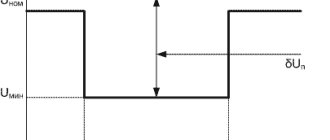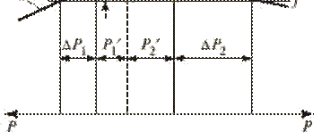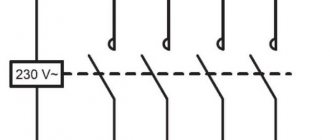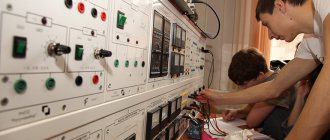The profession of an electrician involves not only working with electricity, but also other skills. Therefore, a person who chooses a path in this area must understand the responsibility and importance of his work. At first glance, it may seem that this work is not very difficult, because a higher education is not required in order to be able to understand the electrical field. But this is fundamentally wrong. An electrician must know well and be able to do the specifics of his work, because it is associated with a great risk to life.
History of the profession
This profession was officially born around the middle of the 19th century, when people had a need to monitor emerging and rapidly developing electrical resources.
For the first time, electricians began to officially start working in England and the USA.
It was in these countries that the need for this kind of labor resources first arose.
The very first such workers became very much in demand on the labor market. The profession began to quickly gain momentum, and as a result, colleges had to open many places for admission to this specialty.
In your free time from work, you can earn extra money
on freelance exchanges (by writing comments, reviews, or simple actions on social networks) - choose what you like best and start earning money!
The tasks and specifics in the electrical field change somewhat every year. This must be taken into account by people who are directly involved in an electrician’s career. As in any other job in the 21st century, a person needs to constantly learn new things in his field, constantly update his skills and abilities, and improve his qualifications.
Who is this profession suitable for?
The profession is suitable for people with well-developed memory and logical thinking. A specialist must know a lot of norms and rules that are necessary to ensure occupational safety.
The electrician has excellent response. Tension often leads to unforeseen situations in which only a cool mind and speed of decision-making can save you.
Caution is an indispensable quality in the work of these specialists. An experienced master will always think twice about his every decision before he puts it into practice.
Painstaking and responsible. An electrician must treat all the details of his work with increased attention, because he is responsible not only for himself, but also for the people around him.
Demand
The profession is in demand. Despite the fact that there are not many vacancies, an electrician can easily find a job. Most students are employed before graduation.
How much do people working in this profession earn?
The average salary of an electrician ranges between 10 and 40 thousand rubles per month. Depending on the region, it may be higher or lower than the indicated amounts.
Is it easy to get a job?
Getting a job is quite easy. You should provide a diploma indicating that you have an initial level of training. However, if there are several applicants, preference is given to the more experienced one.
What an electrician should know and be able to do
Electricians must not only be well versed in the supply of devices, but also their responsibilities include mandatory knowledge of electrical safety, the ability to carry out their work safely, since it is directly related to a great risk to life and high voltage.
An electrician must have the following qualities
character:
- logical thinking;
- attentiveness;
- responsibility;
- good vision;
- accuracy.
A person who works with electrical wires and circuits, loves physics and electrical engineering, and chooses this field as a professional one must be agile and hardworking. It is advisable not to have problems with the cardiovascular system and supporting apparatus.
What is an electrician?
This is a sought-after technical specialty . The work of an electrician is related to the establishment of electrical equipment, its installation and operation. He also does electrical repairs and installations.
The position of an electrician is available in almost any organization whose functioning is impossible without electrical appliances. It works not only indoors, but also outdoors.
Sometimes an electrician has to perform work at height.
IMPORTANT The activity involves regular risks . The specialist must be attentive and know methods of protection against electric shock, and know how to provide first aid to those who have suffered from its effects.
How many categories do electricians have?
There are five categories in total:
- The first includes full-time specialists primarily engaged in ensuring security at any facility. This requires specialized secondary education.
- The second category includes electricians with an education in electronics. They can be employed in larger-scale production, including high-voltage production.
- Third category - this subgroup of people must have all the safety nuances associated with equipment maintenance and electricity.
- The fourth category - electricians with a high level of qualifications, must carry out repair work and carry out preventive maintenance in production.
- The fifth category is highly qualified workers who have deeper knowledge in the field.
- The sixth category is electrical engineers, who are required to have in-depth knowledge in the field of electrical supply, as well as managers and other high-ranking officials.
The category also determines clearance levels for dangerous objects.
The rank number is determined by length of service, level of knowledge and skills. The first group can be obtained by a specialist with little training. Moreover, he may not even work with voltage, but simply be close to it.
Electrician vacancies on the labor market, average salary
Again, given the diversity of the profession, it is difficult to talk about the average income of electricians. Perhaps there are two determining factors here: work experience, qualifications (and, accordingly, the level of electrical clearance). Exactly the same picture is observed in other blue-collar professions: the more qualified a specialist, the more valuable he is, and his services are more expensive.
There are also plenty of vacancies for electricians. Repair specialists, electricians, and scheduled maintenance workers are required. You can also add private contractors here (electricians with house calls, etc.)
Electrician training
Education can be obtained by studying at one of the colleges, technical schools or universities.
In Moscow, higher education can be obtained at the following universities:
- Moscow State Technical University named after. Bauman;
- National Research University;
- Moscow Automobile and Highway State Technical University.
Education can also be obtained by studying not only on full-time or part-time courses, but also remotely. Many universities now widely offer this form of training.
After 9th or 11th grade, a student can enter a college or technical school. This could be an electrical installation technical school or an automotive college.
At the university, education lasts from 4 (bachelor's) to 6 years (master's), depending on the choice of the student. In college and technical school, training can take from 3 to 5 years - the duration depends on the specialty and form of study.
Electrician salary
Its size depends on the rank - the higher it is, the higher the salary. The same goes for work experience .
The average salary in Russia is 16-20 thousand rubles . In Moscow and St. Petersburg, an electrician can count on 30-40 thousand rubles. per month.
And if you develop your business and provide electrical equipment maintenance services to individuals and enterprises, your income will rise to 60-80 thousand rubles . and more. For example, a private electrician in Moscow will not provide services for less than 1,000 rubles, regardless of the complexity of the work.
Where can an electrician work?
The profession requires different levels and types of training, as well as different categories of workers. For example, you can choose for yourself the vacancy of an electrician, electrical technician, circuit designer, electrical engineer and some others. All of them are somehow related to working with tension, but there are big differences between them.
An electrician or electrician may work primarily in private or government-owned enterprises. The tasks of his work will be the installation, testing and repair of sockets and electrical equipment, ensuring safety, preparing devices for operation, installing insulators and searching for possible faults with their subsequent elimination, as well as many other tasks.
Job descriptions of the profession
The following duties can be identified that an electrician must perform:
- Engaged in laying electrical cables.
- Connects equipment.
- Conducts the necessary calculations of cable dimensions.
- Involved in drawing up a plan for the placement of electrical registers.
- Performs preventive inspections and routine repairs of electrical devices.
- Carries out installation work and also carries out installation of secondary circuits.
- They are engaged in the repair of electrical networks.
- Engaged in the installation of insulators and sockets.
- Prepare the devices before turning them on.
- They look for faults and carry out further repairs.
- They train personnel in the field of safety when working with electrical devices.
- They also gain new knowledge.
Relevance of the profession today
The vacancy is quite relevant for any region of Russia or any other country. Electricians will never be left without work, because in any place we are connected with electricity and we always need a person who will be able to handle it competently.
Currently, electricians are increasingly required due to the need to install high-voltage equipment, electrical wiring and expand communication networks, so the career of an electrician is developing rapidly if a person has the desire.
Who can become an electrician
If you are not interested in such exact sciences as mathematics and physics, then this type of activity is unlikely to suit you.
Electricians of the highest category must be excellent at drawing, have a good understanding of circuits, and master the basics of electronics and applied mechanics. And among personal properties the following are welcome:
- attentiveness and caution, responsibility and accuracy. Often, not only the normal operation of the electrical network, but also his own life depends on the actions of an electrician, since he often has to work under voltage;
- sharp vision. A visually impaired electrician can easily stick a screwdriver in a completely different place than intended, and, as a result, remain disabled or cut off power to an entire enterprise;
- physical endurance and good vestibular apparatus. In other cases, it is necessary to climb high up and spend time in uncomfortable positions, which is not possible for people with weakened legs and the body in general.
There are other medical contraindications. For example, in case of diseases of the spine, the path to electricians is prohibited. If you have a poorly functioning heart, problems with your lungs or mental disorders, you should also not choose this profession as your field of activity.
Who is an electrician? First of all, he is a person with a high degree of civic responsibility. He will never ignore safety measures so as not to endanger himself or those nearby.
You might be interested in the article: Who is a radio engineer?
Career growth and development
To become an electrical engineer, you need to obtain a college degree. The same applies to those who want to work as an electrical engineer, electromechanic or high-level specialist. The difference between them is small. In other cases, higher education is not required.
Therefore, for people who have received specialized secondary education or are working from scratch, there is an opportunity to improve their qualifications and thereby increase their salaries.
For those who already have a higher education, there is always a chance to improve their rank.
This way you can get a job as a production manager or manager of an enterprise or workshop.
Responsibilities of an electrician
The responsibilities of an electrician largely depend on his category and place of work. But there are several responsibilities that are typical for this profession:
- maintenance and repair of electrical equipment and wiring;
- laying power cables and wiring;
- calculation of the required cross-section of power cables;
- drawing up a power supply diagram for the premises;
- installation of electrical wiring and connection of new equipment;
- improvement of the electrical wiring diagram when connecting new capacities.
Working as an electrician involves constant monitoring of the condition of electrical wiring and equipment without reminders from management. The responsibilities of an enterprise employee can be expanded, but all the work that he must perform is specified in the job description. The electrician's instructions contain a list of all possible jobs that can be entrusted to an employee holding a certain position and having the appropriate level of qualifications.
Advantages and disadvantages of the specialty
As they gain experience and grow professionally, electricians can earn quite good money. These specialists are in demand in any region or city.
Among the absolute advantages are the following:
- possibility of additional employment and part-time work;
- good salary;
- demand in the labor market in any country;
- opportunity for career growth;
- convenient work schedule.
Among the shortcomings are the following:
- very responsible and dangerous work;
- work at height possible;
- Some regions may have low wages.
There are many more pros than cons. Therefore, many young people choose a career as an electrician, knowing that they will not be left without work.
What personal qualities should an electrician have?
As we already mentioned above, the work of an electrician is classified as very dangerous, and therefore a specialist, first of all, must have such personal qualities as accuracy and caution. In addition, the following will help him do his job efficiently:
- responsibility;
- concentration;
- attentiveness;
- excellent response;
- confidence in your actions;
- painstakingness;
- organization;
- technical mindset;
- developed fine motor skills;
- spatial imagination;
- logical thinking.
Let us note that if previously, to become an electrician, it was enough to understand primitive circuits and devices, then modern specialists must have basic knowledge of mathematics, physics, mechanics and drawing. They must also be able to use formulas, read diagrams and drawings, provide first aid and know the technical characteristics of various devices and instruments.
Famous representatives of the profession
Inventor in the field of electrical and radio engineering
Inventor in the field of electrical and radio engineering of Serbian origin, scientist, engineer, physicist
More details
Yablochkov Pavel Nikolaevich
Outstanding Russian electrical engineer
An outstanding Russian electrical engineer, military engineer, inventor and entrepreneur. Known for the development of the arc lamp and other inventions in the field of electrical engineering.
More details
Conditions and remuneration
Working conditions will depend on the chosen organization. They will be comfortable in offices and sanatoriums; construction sites are dusty and noisy. When laying electrical networks, you will have to work outside regardless of weather conditions, including hot and cold. Working conditions can be chosen at your discretion.
The salary of a beginning electrician is on average 7,000–9,000 hryvnia. Experienced specialists with a high clearance group can earn up to 23,000 hryvnia.
For engineering and technical workers (E&T), the salary ranges from 10,000 to 30,000 hryvnia, depending on the place of work and the complexity of the tasks performed.
Types of work performed by electrical installation specialists
It is not often possible to make repairs without the intervention of specialists such as electricians. Electrical work covers many different services.
Working with wiring
There are two types of wiring: hidden and open. Open installation involves fixing it near a pre-prepared wall. In order to protect the wiring from damage, cover it with skirting boards and special cable channels. Externally the room is changing for the better. This type of gasket allows, if necessary, to simply prevent the resulting malfunctions. When installing electrical wiring hidden in the wall, it is necessary to punch grooves - these are special recesses into which the wires are placed and then walled up. When the decoration of the room is completed, the wiring is hidden in the wall and becomes completely invisible: except for the places where it comes out of the wall or ceiling, where it is connected to a chandelier or other electrical appliance. If repairs or complete replacement of wires are required, then it will not be possible to do without opening the wall; you will also have to carry out light external repairs.
Electric meter installation work
This service is required for all new apartments. Electric meters allow you to control consumption and seriously reduce costs, especially when paying utility bills. If the owners have a desire, then you can order the installation of meters that separate tariffs, which separately calculate the electricity consumption for daytime and nighttime. This allows you to save even more money: prices for a night tariff can be very different from a day rate.
Installation of video and audio intercoms
In addition to intercoms, a specialist can offer installation of communication systems, surveillance systems, automated gates and others that provide security. Most often, services of this type are needed by people from the private sector to independently organize the protection of their home.
Electrical equipment
Services related to the installation of electrical equipment, its replacement and relocation. This is necessary for almost every owner moving to a new apartment. Previously, apartments relied on a small number of electrical appliances. Today, sockets are placed more thoughtfully and rely on a large number of electrical equipment, and switches complement comfortable living conditions.
Devices
Help with connecting and installing electrical appliances. There is equipment that can be easily turned on using a regular outlet, such as a blender. There are others that require some tricky pre-connection. Most often this applies to powerful appliances, such as stoves, powered by electricity. As a rule, unusual sockets with a voltage of 380 V require correct connection.
Installation of artificial lighting
This includes: placing lamps on the walls, lanterns in the garden, illuminating various objects, and so on. This work is often done in stages. First, active repairs are carried out: they begin to pull wires, lay wiring to the places where the lamps will be placed. Then follows the finishing of the room and installation of the lamps themselves.
Warm floor
Work on installation of floors with electric heating. In order for the floor to delight you with its warmth and serve for a long time, you need to take care of high-quality installation, which is better to entrust to professionals.
Phone and TV
Today it is difficult to imagine an apartment without a television cable, telephone connection cable, and so on. Electrical installation specialists also work with cable networks.
Smart House
Working with Smart Home technology and others. These technologies are gaining popularity every day, although the cost is still high. With their help, it is easy to control the microclimate in your home: air humidity, temperature. It will be useful to automatically turn on heating, lighting and air conditioning. Stable and high-quality operation of a “Smart Home” requires the smooth operation of a huge number of devices, and this in turn presupposes proper installation and repair.
Connecting the shield
Work with distribution board, transformers and substations, control cabinet. Here the actions are aimed at facilitating the management of many systems in the home: from controlling the water supply to manipulating the electrical network. Assembling and working with a switchboard is considered a very dangerous task. For reliability and safety, it is trusted only to qualified specialists and professionals in their field.
Profession electrical engineer
The profession of electrical engineer is suitable for people with a good memory and logical thinking. This is due to the fact that such a specialty requires mandatory training in occupational safety, as well as the study of norms and laws that directly relate to this field of activity.
Expert opinion
Ekaterina Kolokolova
Career guidance. Certified specialist in the problems of children's involvement in learning.
Electricians face increased danger every day because they have to work with high voltage. People's lives depend on the qualifications and attentiveness of an engineer. Therefore, representatives of this profession undergo mandatory training, within the framework of which they are taught specialized knowledge and instilled in appropriate skills. The level of admission and salary depends on the latter.
Difference between Electrician and Electrical Engineer
The difference between these professions lies in the area of responsibility. Electricians (electricians) have the knowledge and skills necessary for installation, maintenance and repair of electrical equipment and networks. Representatives of this profession are engaged in the installation and restoration of household appliances.
Electricians are usually understood as persons authorized to work with low- and high-voltage equipment, including at height. But in practice, both directions are equivalent to each other.
However, to maintain and repair high-voltage networks, you will need not only to be able to work with the appropriate equipment, but also to obtain the necessary rating and approval.
An electrical engineer deals with the design and calculation of power systems and devices. In particular, responsibilities include the development of technical documentation and control over the installation of equipment and electrical systems.
An electrician is a specialist in the installation, repair and maintenance of electrical equipment and electrical circuits.
Description of the profession of electrician
Electricians are required in large and small businesses and for servicing private homes. Engineers must meet the following requirements:
- attentiveness;
- ability to remember a large amount of information;
- accuracy;
- increased responsibility.
Due to the described requirements, people with diseases of the cardiovascular system and musculoskeletal system cannot work as an electrician. Also, persons with unstable mental health and addiction to alcohol or drugs are not allowed to access electrical equipment.
Responsibilities of an Electrical Engineer
The range of responsibilities is determined by the clearance level and assigned rank. The scope of activities of representatives of this profession includes:
- design and installation of electrical networks with subsequent connection of buildings;
- installation of equipment and cables, including in hard-to-reach areas;
- repair of power lines;
- testing and commissioning of electrical equipment;
- installation of electrical wiring inside buildings.
The scope of responsibilities includes training novice installers in the rules and features of working with electrical networks and related equipment, as well as safety rules for working with electrical appliances and first aid methods in case of electric shock.
In addition to these duties, the responsibilities of a representative of this profession include tasks, the type of which varies depending on the place of employment.
Sample job description
Sample instructions (Page 2)
Qualification
Job responsibilities and clearance level depend on the rank (qualification):
- Second. Assigned to persons who have acquired the necessary knowledge in this field and have primary functional skills in working with electrical equipment. Electricians of the second category perform the role of an auxiliary employee in areas for which specialized safety requirements are not imposed.
- Third. Electricians with this permit have the right to perform some types of electrical work, but under the supervision of a specialist of a higher level.
- Fourth. Access is provided to the main types of responsibilities required for electrical engineers.
- Fifth. In addition to the duties listed above, electrical engineers with this rank have the right to supervise workers with less qualifications.
- Sixth. Electricians with such qualifications have the right to carry out work on electrical networks with voltages above 15 kV.
To obtain the next rank and increase the salary level, both professional education and specific skills and the necessary experience are required. A similar division is provided for energy security groups. Gradation in this case is carried out taking into account the level of knowledge of the relevant standards, which determine the rules for working with electrical devices and servicing them.
The work of electricians involves constant risk during work and requires care and knowledge of how to protect against electric shock.
Advantages and disadvantages
The advantages of becoming an electrical engineer are as follows:
- the level of earnings depends on the qualifications and abilities of the electrician;
- you can combine work at two or more enterprises;
- demand for the profession.
- The main disadvantage of the profession is the increased danger that electrical engineers face on a daily basis.
- The second disadvantage is the need to work at height.
An electrician must have a complex of knowledge
First of all, the job responsibilities of an electrician include the need to have a large amount of knowledge, without which he will not be able to cope with the tasks assigned to him. The electrician must be familiar with the legal framework that provides and regulates his activities. This includes laws, orders and all regulations that govern the operation of electrical equipment and electrical networks by both professionals and consumers. In addition, he must have knowledge of technical safety and rules for the use of electricity. And as a specialist – have a technical component of knowledge in metrology, electronics and electrical engineering. He must be familiar with the basics of electric drives and power supply and be able to carry out diagnostic procedures for electrical equipment.
Another important document that this specialist must constantly refer to is the electrician’s instructions.
Where to study to become an electrical engineer
You can gain practical knowledge and skills as an electrical engineer by:
- In crash courses. The level of education in this case helps to obtain the initial rank of electrician.
- At a technical school (college). The level of education obtained here over time helps to achieve the last (fifth) category.
- At the university. Higher education opens access to leadership positions and provides the opportunity to engage in electrical network design.
Electrical engineers are also recommended to attend specialized courses to improve their qualifications, after which they can be awarded the next rank.











